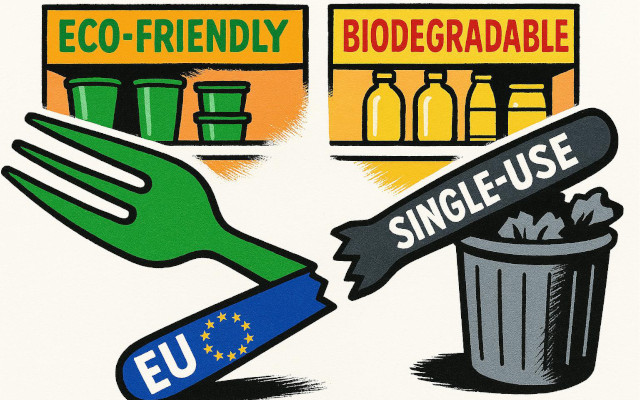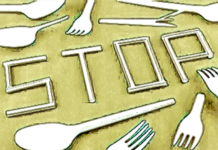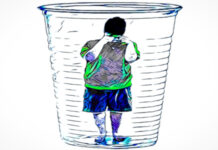Dishes, glasses, cutlery and other plastic tableware described as ‘reusable’ are invading the shelves of supermarkets and shops, but consumer information is often contradictory, incomplete or even absent. This is what emerges from the survey ‘Usa&getta o riutilizzabile? Facciamo chiarezza’ conducted in Italy by the Legambiente association, which analysed 317 products from 70 different brands, revealing a worrying picture of misinformation and ambiguity.
The SUP Directive and the gap to be filled
From January 2022, the European SUP (Single Use Plastic) directive – transposed in Italy by Legislative Decree 196/2021 – bans the sale of single-use plastic tableware. However, the legislation does not clearly define what makes a product ‘reusable’, leaving room for arbitrary interpretations.
The result? A wide range of very similar disposable products, labelled as ‘reusable’ but often lacking clear indications on washing, durability and disposal.
The numbers of confusion
The Legambiente survey reveals numerous irregularities that may favour the use of ‘reusable’ tableware as disposable. The analysis of the 317 products (sampled in the first half of 2024) covers three types of information.
– Origin and materials. 76.7% of the analysed products are made in Italy, but 5.7% do not report any information on origin. As for materials, 55.5% are made of polystyrene (PS06) and 31.5% of polypropylene (PP05), but labels are often generic or misleading.
– Washing and use. 38% of products do not specify the number of possible washes, while among those that do, 50% magically indicate ‘20 washes’, regardless of the material. Only 26.8% give both dishwasher and microwave indications, but only 8% provide complete data on temperatures.
– Certifications. Only 35% of the products have at least one certification, and 70% of these relate to non-reusability aspects (such as environmental management). Only 17% of the sample mentions the UNI EN 12875:2005 standard on resistance to washing, but this does not guarantee actual reusability.
Legambiente’s proposals
In order to prevent banned single-use plastic from re-entering into circulation with a simple name change, Legambiente puts forward three concrete proposals:
– define by law the concept of ‘reusable’, clarifying minimum requirements for durability and resistance;
– create mandatory labelling with clear information on washing, temperatures and disposal;
– monitoring the flow of re-use on the market to verify the effectiveness of anti-plastic measures.
The risk of greenwashing
‘We are facing yet another case of greenwashing’, denounces Stefania Di Vito, co-author of the study. ‘Products passed off as sustainable risk ending up in the bin after just a few uses, thwarting regulatory efforts. Clear rules and controls are needed‘.
Meanwhile, consumers are navigating by sight:
– 18.6% of tableware carries no disposal information,
– 42.7% of ‘microwave-safe’ dishes do not specify maximum temperatures.
A labyrinth of information that, instead of favouring the ecological transition, risks undermining its credibility by circumventing the rules.
Marta Strinati
Cover art copyright © 2025 Dario Dongo (AI-assisted creation)
References
Report ‘Usa&getta o riutilizzabile? Facciamo chiarezza!’. Legambiente. Febbraio 2025. https://www.legambiente.it/wp-content/uploads/2025/03/report-usa-e-getta_2025.pdf
Professional journalist since January 1995, he has worked for newspapers (Il Messaggero, Paese Sera, La Stampa) and periodicals (NumeroUno, Il Salvagente). She is the author of journalistic surveys on food, she has published the book "Reading labels to know what we eat".








